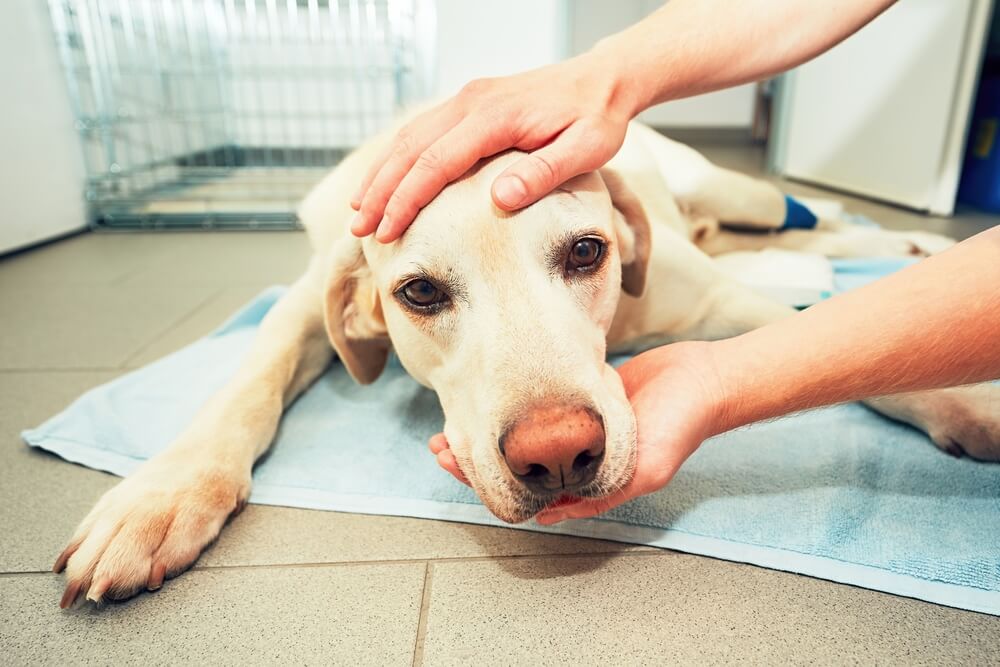
When their pet is diagnosed with cancer, owners often feel guilty for not catching the problem sooner, but not all cancer forms can be detected in the earliest stages, because many signs are subtle and nonspecific. However, as with people, the earlier your pet’s cancer is detected, the better their prognosis. Our Towne Centre Animal Hospital has compiled a list of the eight most common cancer warning signs in pets—signs that do not indicate only cancer, but that should be checked by a veterinarian. You could save your pet’s life.
#1: A pet who limps
Limping is a common arthritis sign, particularly in senior pets, but can also signal osteosarcoma (i.e., bone cancer), which is extremely painful. A pet with osteosarcoma of the limb will limp, show reluctance to walk or play because of the bone tumor pain, and show other painful signs, including:
- Decreased activity
- Reluctance to use the stairs
- Difficulty standing after lying down
- Decreased appetite
- Over-grooming or licking a particular area
#2: A pet with diarrhea or changes in bathroom habits
An occasional bout of diarrhea usually is not cause for concern, but chronic diarrhea can be a cancer sign, as well as the following changes in bathroom habits:
- Frequent accidents
- Difficulty urinating or moving bowels
- Blood in the urine or stool
While straining to urinate and blood in the urine are common urinary tract infection signs, if the infection is not resolved with antibiotics or keeps recurring, your pet may have bladder cancer.
#3: A coughing pet with breathing difficulties
Persistent coughing or abnormal breathing can result from allergies, a respiratory condition (e.g., bronchitis), heart disease, lung disease, and also cancer. The most common lung cancer sign in pets is a chronic cough, but some pets will cough up blood, which could be the result of blood vessel damage from a tumor. If your pet coughs up blood, they need immediate veterinary care.
#4: A pet with unexplained weight loss
Rapid weight loss is a common cancer sign in pets. Weight loss can occur because a tumor is placing metabolic demands on the body, cancer-associated pain causes a decreased appetite, stomach or intestinal tumors obstruct normal food passage or nutrient absorption, or an oral tumor causes difficulty chewing and swallowing.
#5: A pet whose wounds won’t heal
Sores that don’t heal easily or that scab over, appear to go away, but keep recurring can also signal cancer. Aggressive mast cell tumors, which are a form of skin cancer, grow rapidly and may ulcerate, leaving sore, inflamed areas on the body. Sores that do not heal can also mean cancer has weakened your pet’s immune system.
#6: A pet who smells bad
Strong, unpleasant odors from your pet’s body, particularly the mouth, nose, ears, or anal region, can be a sign of a cancerous tumor.
#7: A pet with lumps and bumps
Not all lumps and bumps on or under your pet’s skin are cancerous. Some lumps may be benign fatty tumors, a tick that needs to be removed, a skin tag or mole, or a swollen area from bumping into a piece of furniture. However, you can never be sure a lump is benign, so always get your pet tested by a veterinary professional, who can take a needle biopsy to determine whether or not the cells are cancerous.
#8: A pet with abnormal bleeding or discharge
Abnormal bleeding, vomiting, diarrhea, or pus from a pet’s body can signal several serious health conditions, including cancer. Nose or mouth cancer can break down the nose cartilage and cause bleeding, and liver failure because of cancer can also cause bleeding. Your pet’s abdomen may bloat or be distended if abnormal fluid (i.e., blood) accumulates inside their body.
Early detection gives your pet the best chance of a full cancer recovery, so watch out for these signs. Also, ensure your pet has regular wellness exams that include screening for cancer. If your pet shows any signs that make you concerned about cancer, contact our team at Towne Centre Animal Hospital to schedule an exam, and put your mind at ease, or to discuss next steps.

